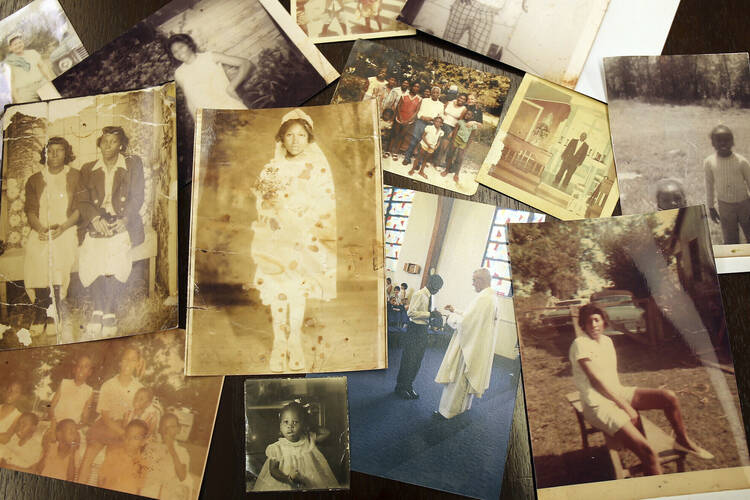The Jesuits have committed an additional $10 million as part of the ongoing partnership between the Society of Jesus and the descendants of people once enslaved by the religious order.
The U.S.A. East Province of the Society of Jesus pledged $2 million each year for the next five years to the Descendants Truth and Reconciliation Foundation, which was created in 2021 to support the educational aspirations of the descendants of those enslaved by the Jesuits and to promote racial healing and reconciliation.
The pledge matches the $10 million Georgetown University committed over the same period, according to an announcement from the province. In addition to committing to match Georgetown’s pledge, the province also contributed $7 million earlier this year based on the value of former plantation land owned by the province. The sale of 272 enslaved persons by the Jesuits in 1838 helped provide financing for the struggling university.
“These contributions from Georgetown University and the Jesuits are a clear indication of the role Jesuits and other institutions of higher education can play in supporting our mission to heal the wounds of racism in the United States, as well as a call to action for all of the Catholic Church to take meaningful steps to address the harm done through centuries of slaveholding,” Monique Trusclair Maddox, a descendant who is the CEO of the foundation and chair of the board of directors, said in a press release.
The Jesuits have committed $42 million to the foundation to date. Two years ago, the Jesuits pledged to raise $100 million to support the work of the foundation, which was formed by the Society of Jesus and the GU272 Descendants Association to help heal the deep racial wounds that persist in the United States. The matching $10 million pledges and the $7 million given by the province earlier this year total to $27 million of gifts newly announced today.
“Continuing commitments such as these get us closer to reconciling this nation’s original sin and to healing the disease of racism in our nation."
“When Descendants and Jesuits created our partnership, we shared the belief that a moral approach to truth, healing and reconciliation offers the greatest opportunity to uplift future generations of Descendants—dismantling the remnants of slavery while healing this nation of hate and racism,” said Joe Stewart, a fifth-generation descendant, chair emeritus and co-founder of the foundation. “Continuing commitments such as these get us closer to reconciling this nation’s original sin and to healing the disease of racism in our nation."
The foundation, through the Thurgood Marshall College Fund, will distribute $400,000 in educational grants to descendants next year, he said. That same year, an additional $400,000 will support racial healing initiatives.
“Jesuits U.S.A. East remains deeply devoted to our partnership with the Descendant community and to working together for racial reconciliation and healing in this country,” according to a press release from the province. “We are dedicated to the long-term vision of healing the scars of slavery by pursuing hope and advancing our tireless goal for social justice.”
The descendants trust has a long-term goal of raising $1 billion. The foundation will also provide support to elderly and infirm descendants.
“The work of reconciliation—grounded in a deep reckoning with the pain and injustice of slavery and its legacies—is an expression of hope. The [foundation] has put forth an extraordinary vision to uplift Descendant communities, support the educational aspirations of Descendants, and promote racial healing in our nation,” said John J. DeGioia, president of Georgetown. “The difficult truths of our past guide us in the urgent work of seeking and supporting reconciliation in our present and future.”
“The work of reconciliation—grounded in a deep reckoning with the pain and injustice of slavery and its legacies—is an expression of hope."
The Maryland Province of Jesuits sold 272 enslaved persons in 1838. At the time of the sale, the Jesuits had been owners of enslaved people for more than 100 years. They acquired enslaved individuals as gifts and through purchase. Additionally, according to historians, the children of enslaved women were also enslaved.
The Jesuits were the biggest planters in Maryland at the time and grew tobacco, the cash crop of the region. Enslaved persons owned by the Jesuits also worked in carpentry, as cooks and as artisans. Owning enslaved people became less profitable in the 19th century, and the Jesuits eventually decided to sell the enslaved people they owned to plantations in the Deep South. Today, there are more than 10,000 descendants of the 272 enslaved individuals sold by the Jesuits.
The current $42 million sum contributed to the trust includes the two recent $10 million pledges and the $7 million contributed earlier this year based on the value of land owned by the province where some of the descendants’ ancestors were enslaved near Washington, D.C.
The first meeting of descendants took place in August 2016. While they did not know each other well, nine descendants got together, according to Mr. Stewart, who is a descendant of Isaac Hawkins, one of the 272. They had learned more about their ancestry through an article in the New York Times and the Georgetown Slavery Archive, created by the university in 2016 to archive material related to the Maryland Province of the Society of Jesus (now part of the U.S.A. East Province of the Society of Jesus).
“As a Catholic community, it is imperative that we don’t turn away from our sinful history of slaveholding and instead look inward at how we can right past wrongs with justice, healing and compassion,” said Tim Kesicki, S.J., chair of the trust.








